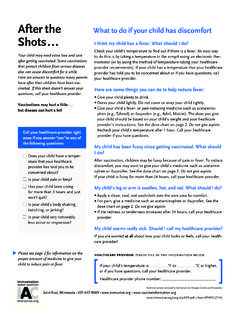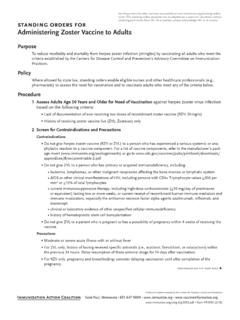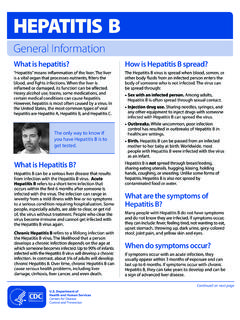Transcription of Hepatitis A B and C Learn the Differences - immunize.org
1 HAV is found in the feces (poop) of people with Hepatitis A and is usually spread by close personal contact (including sex or living in the same household). It can also be spread by eating food or drinking water contaminated with HAV and by traveling internationally where HAV infection is is found in blood and certain body fluids. The virus is spread when blood or body fluid from an infected person enters the body of a person who is not immune. HBV is spread through having unprotected sex with an infected person, sharing needles or works when shooting drugs, exposure to needlesticks or sharps on the job, or from an infected mother to her baby during birth.
2 Exposure to infected blood in ANY situation can be a risk for transmission. All infants, children, and teens ages 0 18 years Any adult who wants to be protected from HBV infection Sexually active people who are not in long-term, mutually mo-nogamous relationships Men who have sex with men People seeking evaluation or treatment for a sexually transmit-ted disease Healthcare or public safety workers who might be exposed to blood or body fluids Residents and staff of facilities for developmentally disabled people Adults under 60 years of age with diabetes Dialysis and pre-dialysis patients People infected with HIV People in close personal contact (.)
3 Household or sexual) with someone who has chronic HBV infection Current or recent injection-drug users Travelers to regions of the world where Hepatitis B is common (Asia, Africa, the Amazon Basin in South America, the Pacific Islands, Eastern Europe, or the Middle East); People with chronic liver diseaseThere is no vaccine to prevent HCV. Testing for HCV is recommended for the following groups of people. People born during 1945 1965 Injecting drug users Recipients of clotting factors made before 1987 Hemodialysis patients Recipients of blood or solid organ transplants before 1992 Infants born to HCV-infected mothers People with undiagnosed abnormal liver test results Although HCV is not commonly spread through sex, Individuals having sex with multiple partners or with an infected steady partner may be at increased risk of HCV infection.
4 Hepatitis Acaused by the Hepatitis A virus (HAV) Hepatitis Bcaused by the Hepatitis B virus (HBV) Hepatitis Ccaused by the Hepatitis C virus (HCV)How is it spread?Who should be vaccinated?SymptomsWhat treatment helps?How is it prevented?Viral Hepatitis symptoms are similar no matter which type of Hepatitis you have. If symptoms occur, you might experience any or all of the following: jaundice (yellowing of the skin and whites of the eyes), fever, loss of appetite, fatigue, dark urine, joint pain, abdominal pain, diarrhea, nausea, and vomiting. Very rarely, a recently acquired case of viral Hepatitis can cause liver failure and death.
5 Sometimes in these instances, a liver transplant (if a liver is available) can save a life. Note: For all types of viral Hepatitis , symptoms are less common in children than in adults, and for people of any age with HCV infection, they are less likely to experience period: 15 to 50 days, aver-age 28 daysThere is no chronic infection. Once you have had HAV infection, you cannot get it again. About 15 out of 100 people infected with HAV will have prolonged illness or relapsing symptoms over a 6 9 month period. Incubation period: 60 to 150 days, average 90 daysChronic infection occurs in up to 90% of infants infected at birth; in about 30% of children infected at ages 1 5 years; and less than 5% of people infected after age 5 years.
6 In the , 2,000 to 4,000 people die each year from Hepatitis B. Death from chronic liver disease occurs in 15% 25% of chronically infected people People who have chronic HBV infection have a much higher risk of liver failure and liver cancer. Incubation period: 14 to 180 days, average 45 daysChronic infection occurs in 75% 85% of newly infected people and 70% of chronically infected people go on to develop chronic liver disease. In the , an estimated 8 10,000 people die each year from HCV. People who have chronic HCV infection have a much higher risk of liver failure and liver cancer. Chronic HCV-related liver disease is the leading cause for liver A, B, and C.
7 Learn the Differences People who wish to be protected from HAV infection All children at age 1 year (12 23 months) Men who have sex with men Users of street drugs (injecting and non- injecting) People who travel or work in any area of the world except the , Canada, Western Europe, Japan, New Zealand, and Australia People who will have close personal contact with an international adoptee, from a country where HAV infection is common, during the first 60 days following the adoptee s arrival in the People with chronic liver disease, including HCV People working with HAV in a laboratory People with clotting factor disorders ( , hemophilia) Item #P4075 (3/14)Immunization Action Coalition Saint Paul, Minnesota (651)
8 647-9009 There is no treatment for HAV other than supportive care. Avoid alcohol. It can worsen liver disease. People with chronic HBV infection should have a medical evaluation for liver disease every 6 12 months. Several antiviral medications are currently licensed for the treatment of individuals with chronic HBV. These drugs are effective in preventing serious liver problems in up to 40% of patients, but the drugs do not get rid of the virus. Liver transplant is the last resort, but livers are not always available. Avoid alcohol. It can worsen liver disease. There is no medication to treat recently acquired HBV infection.
9 People with chronic HCV infection should have a medical evaluation for liver disease every 6 12 months. There are drugs licensed for the treatment of individuals with chronic HCV infection. Combination therapy is currently the treatment of choice and can eliminate the virus in approximately 40 50% of patients with genotype 1 (the most common genotype in the ). Get vaccinated against Hepatitis A and B. Avoid alcohol. It can worsen liver disease. There is no medication for the treatment of recently acquired HCV infection. Get vaccinated! Safe and effective vaccines to prevent HAV infection have been available in the since 1995.
10 Always wash your hands with soap and wa-ter after using the toilet, changing a diaper, and before preparing or eating food. For a recent exposure to someone with HAV or if travel is soon (leaving in less than 2 weeks) to an area of the world where Hepatitis A is common, see your healthcare provider about your need for Hepatitis A vac-cine or a dose of immune globulin (IG). Get vaccinated! Hepatitis B vaccination is the best protection. Three shots are usually given over a period of six months. Whenever a woman is pregnant, she should be tested for Hepatitis B (HBsAg blood test); infants born to HBV-infected mothers should be given HBIG ( Hepatitis B immune globulin) and vaccine within 12 hours of birth.
















